Aristotle's Poetics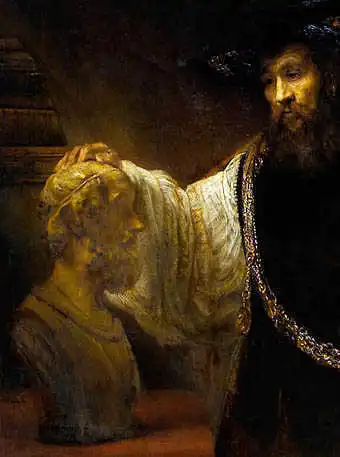 The Drama Theory and Influence of the PoeticsAristotle's PoeticsAlthough there are literally countless stories, and have been for as far back as we are able to see, we still lack any generally accepted list of rules for how they are and should be made up. There is no standard established, with one important exception: The Poetics of Aristotle, to which the discussion returns, again and again as it has done through history, ever since the fourth century BC, when the text of Aristotle's Poetics took form.
Aristotle's The Poetics is all about drama, plays performed by actors in the presence of an audience. Still, Aristotle's thoughts have proven to adhere not only to the stage through the many centuries, but equally to new performing arts media such as the movie screen and the tv set. To some limited extent, also, the dramatic principles of Aristotle's Poetics can be applied to any fictional story, whether it be told by actors or by silent pages in a book.
Myth as dramaBrander Matthews, an American playwright and teacher of literature, who in 1899 at Columbia University was the first at an English-speaking university to be appointed Professor of Dramatic Literature, states in The Development of the Drama, 1903, that the principles and structure of the drama form "an unbroken chain from the crudest mythological pantomime of primitive man down to the severest problem-play of the stern Scandinavian, whose example has been so stimulating to the modern stage." (The Scandinavian mentioned would be Henrik Ibsen.)Yet, in recognition of at what Aristotle himself aimed his words in the Poetics, one should use caution in applying them to other stories than those performed on a stage whether it is the floor of a theater or the stage of the silver screen. It cannot be automatically assumed that what goes for drama according to Aristotle's Poetics, also as readily applies to novels and short stories, or for that matter: myth. With myth, though, it has to be decided to what extent it relates to oral tale, to written fiction and to drama. The answer is not obvious. Myths of central and cosmological nature were most likely orally transmitted, long before they were written down, and although they may have transformed greatly in that process from mouth to pen, they were certainly given their plot and structure already well before. As oral tales, they need to be much closer to the enacted drama than a written story must, or they would most likely have been forgotten through the generations. Also, it is commonplace in cultures past and present, to enact their central myths if not in pantomime, so in performances with more or less of a ritual structure. But the most firm indication of their dramatic nature is the structure of all those myths remaining with us, either in documents only, or in practice as well. A vast majority of them have clear signs of the same drama structure as can be found in most plays of the world, as well as in Aristotle's Poetics, and other literature on the construction of the drama. Definitely, the principles of the drama are present in myths, at least to the extent that those principles are meaningful to apply to them.
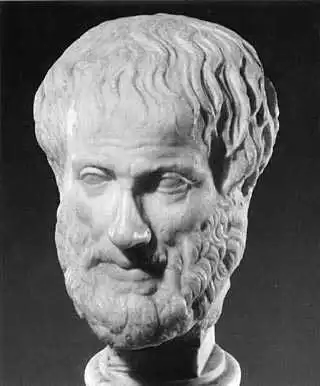 Aristotle.
Aristotle Read and MisreadIn the case of drama, Aristotle's words in The Poetics have set the standard, to the extent that there has in the western world not been any theory of the drama, or discussion of its structure and inner workings, without reference to Aristotle in all periods when the Poetics was known. His short book is somewhat the stage on which all such thoughts have been acted out. It is adequate to regard all western theory of drama as comments on Aristotle's Poetics - little more, but sometimes less, in the sense that Aristotle's thoughts are repeated without much comment at all.In the Roman empire, on the stage of the Renaissance, through to the framework according to which every Hollywood movie is constructed, the dramatic rules expressed by Aristotle's Poetics have been obeyed. Aristotle's theories have never really been questioned, at least not dismissed, but some of the later interpretations of them have. When Aristotle and his Poetics can be doubted, this is usually because of a questionable later rephrasing of them, often in such a way that his words have been misinterpreted to be more categorical, more decisive, than they really are. Therefore, Aristotle has been questioned mainly when his rules of the drama have been regarded as more firm than he himself would have them in his Poetics, the most significant example of which is in the doctrine of the unity of time and place the idea that a drama should only encompass the time span it would take to enact it, and occupy only the space that would fit onto a stage. Aristotle's Poetics doesn't state so.
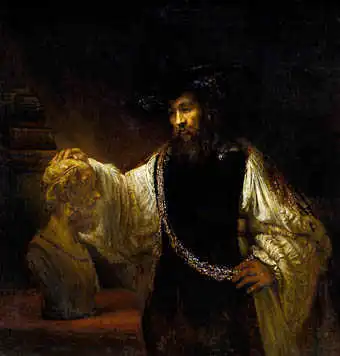 Aristotle with a bust of Homer, by Rembrandt 1653. Aristotle admired Homer's work the Iliad and the Odyssey and used them frequently as examples in his Poetics.
Still, the influence of Aristotle's Poetics has got its gaps one being the fact that it was unknown to the Christian Era of European thought, with minor exceptions, until the very end of the 15th century, when in 1498 the Giorgio Valla Latin translation of Aristotle's Poetics was printed in Venice, swiftly to be followed by a number of translations and commentaries. Other gaps are in the actual text, which remains with us in an incomplete form. Several parts of the Poetics are missing, but what we have is enough for a reliable understanding of Aristotle's perspectives on the drama and its principles. Here it is:
Drama Principles of Aristotle's PoeticsIt is clear that Aristotle's Poetics is written by someone who takes great delight in drama, but a playwright Aristotle is not. He knows, though, what it takes to write convincingly the poet must have as much of it as possible "before his own eyes," in his own vivid imagination. To persuade the spectators of the play, it needs to be both written and enacted "under the influence of passion," since one needs to be agitated oneself, to agitate others, and so forth. Thereby Aristotle concludes in the Poetics that "poetry is the province either of one who is naturally clever, or of one who is insane."The very basis of Aristotle's definitions of the drama and "how fables must be composed," is what he regards as its root: imitation (mimesis in Greek). Any kind of poetry, actually any art, is a form of imitation what sets the art forms apart is merely with what means the imitations are made. Mankind imitates from childhood and on, Aristotle states in his Poetics, and we take delight in it contrary to the animals. Aristotle states that mimesis is done primarily as a way of learning, of acquiring the knowledge and skills necessary. And we learn according to our individual stature: "men of a more venerable character imitated beautiful actions, and the actions of such men; but the more ignoble imitated the actions of depraved characters." This driving force of imitation is mighty, since learning "is not only most delightful to philosophers, but in like manner to other persons, though they partake of it but in a small degree." Even things upsetting or painful, "such as the forms of the most contemptible animals, and dead bodies," men enjoy imitating in pictures or other ways thereby learning about them. Aristotle does not spell out the conclusion very clearly in the Poetics, but the latter, disturbing form of imitation, gives good reason for why no poetry suffices, if only dealing with delightful things. Narrowing it down to the imitation made in poetry, in the construction of fables, Aristotle sees the major forms being the epic, the tragedy, the comedy, the choric hymn (dithyrambic poetry), and that accompanied by the flute and lyre, all being imitations but differing in three aspects: the means by which they imitate, the objects they imitate and the manner in which they do it. The epic is alone in imitating merely by words, whereas what fits on the stage imitates mainly by action. For the drama, what is being done is absolutely essential, for which Aristotle takes an etymological support in his Poetics, comparing the word drama with the Dorian word dran, to make. (Also the word poetry relates to this, meaning the same, and poet meaning maker.) The word fable Aristotle defines as "the composition of incidents." Now, after simply stating that "imitators imitate those who do something," Aristotle finds a choice to be made as to whom to imitate, and this is a question of vice and virtue, where there are but three possible choices according to the Poetics: "those who are better than we are, or those who are worse, or such as are like ourselves." Here is where Aristotle sees the major difference between tragedy and comedy the former imitating the better, and the latter imitating the worse. Comedy, which Aristotle regards as the lesser of the two, portrays the ridiculous, and not vices which terrify or disgust, since it is necessary with "a portion of turpitude", but not to the extent that serious damage is done or pain induced. That would be better fit for the tragedy. Aristotle's Poetics does not explore the reason for the necessity of this limitation of comedy, but certainly a play not conforming to it would find the audience hesitant to laugh.
TragedyAs for tragedy, Aristotle states in the Poetics that it is "an imitation of a worthy or illustrious and perfect action, possessing magnitude, in pleasing language." It must be acted, not narrated, "through pity and fear effecting a purification from such like possessions." The Poetics stresses that the imitation taking place in tragedy is actually not of the noble men portrayed, but of what deeds they do. The men have certain characters, which are according to their manners, but what lightens or darkens their emotions is none other than their actions, what happens to them.The play must reach an end, "the greatest of all things," and in doing so it "embraces manners on account of actions." A tragedy can do without manners, although it is questionable how well received it will be, but without action not. Manners Aristotle's Poetics defines as those elements which make up what we recognize as a person's character, and it is essential that the person acts and speaks according to his character all through the play, while sentiment is how the one speaking explains his meaning. By these two a person is described, but it is from his actions that his quality is derived. So, what causes the actions? In the Poetics, Aristotle sees two causes: sentiments and moral habit, "and through these actions all men obtain or fail of the object of their wishes." Aristotle concludes in the Poetics that a tragedy has got six parts, or rather ingredients, and none other, which make up its quality: fable, manners, diction, sentiment, spectacle and music. Of these the fable is the principal part, "the soul of tragedy," followed by the manners, then the sentiments, to explain "what is inherent in the subject," then diction putting it all into words. Music is "the greatest of the embellishments", but to Aristotle the spectacle of scenic decorations and effects is the least important to the drama and its power.
Unity of actionAristotle's Poetics states that the fable, the combination of incidents which are the action of the play, should be one one story told, which is not to say it has to be about only one person, since characters are not in the center of the tragedy, but action itself is. So, one action means what we would call one complete story, so arranged in its transactions, "that any one of them being transposed, or taken away, the whole would become different." That which does not make a difference to the story, whether it be included or excluded, "is not a part of the fable." A tragedy lacking in this respect, consisting of many fables instead of just one, Aristotle calls an epic system.In the Poetics, Aristotle points out that this unity of action evidently contains a beginning, a middle and an end, where the beginning is what is "not posterior to another thing," while the middle needs to have had something happen before, and something to happen after it, but after the end "there is nothing else." Aristotle states that the chain of events has to be of such nature as "might have happened," either being possible in the sense of probability or necessary because of what forewent. Anything absurd can only exist outside of the drama, what is included in it must be believable, which is something achieved not by probability alone, "for it is probable that many things may take place contrary to probability." Aristotle even recommends things impossible but probable, before those possible but improbable. What takes place should have nothing irrational about it, but if this is unavoidable, the Poetics suggests that such events should have taken place outside of the drama enacted. In this, Aristotle's Poetics warns that actual history is no guarantee, but rather a limitation risking to diminish the beauty and value of the tragedy, for "poetry speaks more of universals, but history of particulars." Still, Aristotle admits that tragedy tends to make use of actual events and persons, to make the fable more credible, since what has happened must be possible, but what has not would seem unlikely to ever do happen. There is yet reason not to adhere too closely to historic events, since it is by no means certain that all of the audience is familiar with the facts. The poet had better make use of his trade, imitation, and put the story together so that it seems possible, be it with or without actual events. Aristotle's Poetics recommends that the writer should avoid making his plot episodic, where it is "neither probable nor necessary that the episodes follow each other." To Aristotle, this is merely a sign of bad poets, "through their own want of ability." The good poet, on the contrary, knows to make things happen in such a way as not to seem like pure chance, but on account of each other. Then, the events will "possess more of the marvelous," which is also the case if events out of fortune are such that they still give the impression of design, of things happening as they should. According to Aristotle's Poetics, the kind of action in a play, "by which fable allures the soul," is revolution and discovery. The revolution is a "mutation", by which actions turn into a contrary condition, which still has to happen in a probable or even necessary way. The discovery is simply a change from ignorance to knowledge of something central to the plot, but Aristotle regards the beauty of discovery as heightened if it is combined with revolution. An action which includes neither discovery nor revolution, Aristotle calls simple, otherwise complex in which case it is essential that these "should be effected from the composition itself of the fable." To Aristotle, the most beautiful tragedy needs to be complex, and "imitative of fearful and piteous actions." Therefore, it is no good to have the play make worthy men go from prosperity to adversity since this is simply impious, nor to have depraved characters go from adversity to prosperity, which evokes neither fear nor pity, and much the same goes for a depraved man going from prosperity to adversity, though morally pleasing. Pity, says Aristotle in the Poetics, "is excited for one who does not deserve to be unfortunate; but fear, for one who resembles oneself." What remains is a person neither excelling in virtue nor being particularly vicious, who goes through a change of circumstances due to some error. This change should be from prosperity to adversity, not the opposite, to evoke pity. For the same reason, tragic events should not take place between two enemies, but rather between friends or relatives, like when a brother kills a brother, or a son his mother, or intends to do it "such subjects are to be sought for." The turn of events that Aristotle's Poetics favors the most, is when a terrible action is interrupted before completion, such as when someone discovers the mistake about to be made, and avoids it. Then the drama is accomplished, with no damage. Next to best is when a deed is done in ignorance, because it is without wickedness, "and the discovery excites horror." The worst, then, is where someone intends to knowingly make a vicious deed, but does not commit it which is wicked, yet not tragical, "because it is void of pathos."
Unity of timeAs for the length of the play, Aristotle's Poetics refers to the magnitude called for, a grandness indeed, but one which can be easily seen in its entirety in the aspect of length, then, one that can easily be remembered. The ideal time which the fable of a tragedy encompasses is "one period of the sun, or admits but a small variation from this period," but more essential and accurate a limitation is "when the time of its duration is such as to render it probable that there can be a transition from prosperous to adverse, or from adverse to prosperous fortune."The time of the enactment of the play itself, certainly significantly shorter, even, than the limited time Aristotle's Poetics allows for its fable, he divides into the following parts: prologue, episode, exode, and chorus, the last one divided into parados (entry of the chorus) and stasimon (chorus fixed on stage). Th first three, pretty much the beginning, middle and end discussed above, are intervened by the chorus. Another division of the tragedy made in Aristotle's Poetics, is that of complication and development, the first of which is from the beginning until the moment where there is a "transition to good fortune," and the second is from this point to the end.
Unity of placeIn drama the unities are actually three that of action and time, as in Aristotle's Poetics, and then of place, meaning that a drama should not occupy more space than what can realistically be arranged on a stage. This third unity, though, is not present in Aristotle's Poetics, but invented in the 16th century by Lodovico Castelvetro, the Italian translator of The Poetics, and by the French dramatist Jean de la Taille.
The epicAristotle's Poetics gives different conditions for the epic. Where it is essential for the tragedy to be enacted, the epic poem is a narration, following different laws from that of the drama. It is not necessary with the unity of action presented above, but there should be a unity of time, in such a way as "of such things as have happened in that time." What happens, though, is not tending toward any single ending. The epic story requires revolutions and discoveries, as much as tragedy does, and sentiments and a good diction as well. According to Aristotle's Poetics, the main difference between the two is that tragedy cannot imitate several actions taking place at the same time, which the epic, being a narration, has no problem with.At the same time as the epic can contain several possible tragedies, the tragedy does in no way serve as material for an epic, but on the other hand Aristotle's Poetics states that "tragedy has every thing which the epic possesses," but the reverse is not the case. Raising the question of which imitation is the more excellent, the epic or tragic, Aristotle concludes that the tragedy, "being crowded into a narrower compass," becomes more pleasing, also it shows more unity, and can therefore attain its end "in a greater degree". The end being the greatest of all things, tragedy with its superior ending must be the superior form of imitation.
After Aristotle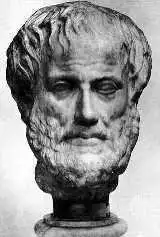
AristotleIntroductionAristotle's LifeTimelineAristotle's PoeticsAristotle's Cosmology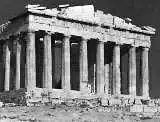
The Greek PhilosophersAbout CookiesMy Other WebsitesCREATION MYTHSMyths in general and myths of creation in particular.
TAOISMThe wisdom of Taoism and the Tao Te Ching, its ancient source.
LIFE ENERGYAn encyclopedia of life energy concepts around the world.
QI ENERGY EXERCISESQi (also spelled chi or ki) explained, with exercises to increase it.
I CHINGThe ancient Chinese system of divination and free online reading.
TAROTTarot card meanings in divination and a free online spread.
ASTROLOGYThe complete horoscope chart and how to read it.
MY AMAZON PAGE
MY YOUTUBE AIKIDO
MY YOUTUBE ART
MY FACEBOOK
MY INSTAGRAM
STENUDD PÅ SVENSKA
|
 Cosmos of the Ancients
Cosmos of the Ancients